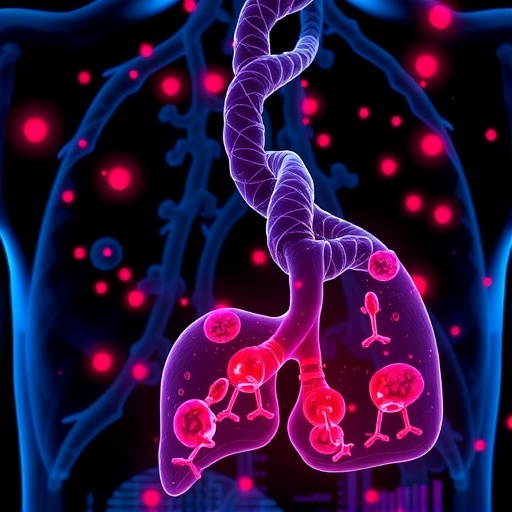In the complex and challenging landscape of cancer diagnosis, determining the tissue of origin for tumors is a critical step for guiding effective treatment protocols and accurately predicting patient outcomes. This task becomes particularly formidable when a tumor’s primary site remains elusive, complicating clinical decision-making and compromising personalized therapeutic strategies. A groundbreaking study from the University of California San Diego offers a compelling solution by identifying distinctive microbial DNA signatures in blood plasma that can differentiate primary liver cancers from colorectal cancers that have metastasized to the liver. This discovery could redefine non-invasive cancer diagnostics and enhance precision oncology.
Cancer metastasis, the process by which malignant cells spread from an original tumor site to distant organs, complicates treatment and often worsens prognoses. Specifically, when colorectal cancer cells invade the liver, they can present diagnostic challenges that conventional imaging or histopathological techniques may not adequately resolve. The UC San Diego team approached this challenge through the lens of microbial genomics, delving into the microbial DNA fragments circulating freely in the bloodstream, known as cell-free DNA (cfDNA). These microbial traces are remnants of microbial populations intimately linked with body tissue microenvironments and pathological states.
The researchers conducted their study on cfDNA isolated from the blood plasma of patients diagnosed with either primary liver cancer or metastatic colorectal cancer involving the liver. Utilizing advanced metagenomic sequencing methods, they profiled the microbial DNA present, revealing unique microbial ecosystems associated with each cancer type. Strikingly, they found that a microbial cfDNA classifier could distinguish between primary liver tumors and metastatic colorectal tumors in the liver with an impressive 90% accuracy, demonstrating a robust discriminatory power well beyond current non-invasive diagnostic benchmarks.
Further scrutiny of the microbial profiles uncovered that primary liver cancer patients demonstrated an abundance of specific bacterial species including Pseudomonas aeruginosa, Corynebacterium accolens, and Corynebacterium glucuronolyticum. These microbes are historically known to be associated with immunocompromised states, complications following liver transplantation, and host antimicrobial defense mechanisms. Their elevated presence hints at an altered immunological and microbial landscape intrinsic to liver tumor biology, potentially reflecting tumor microenvironment dynamics or immune evasion strategies.
Conversely, patients harboring metastatic colorectal cancer exhibited a distinct microbial signature dominated by various Acinetobacter species—including Acinetobacter tandoii, A. tianfuensis, A. septicus, and A. parvus—alongside Pseudomonas asiatica and Bifidobacterium faecale. These bacterial taxa have been implicated in hospital-acquired infections, bloodstream infections, and gastrointestinal inflammatory processes. Their association with metastatic disease underlines a possible link between systemic microbial translocation, inflammatory cascades, and cancer cell dissemination, suggesting that metastatic niches may foster or be influenced by specific microbial populations.
This pioneering research sheds light on the intricate connections between tumor biology and the human microbiome, particularly the circulating microbiome detectable through cfDNA analysis. The researchers emphasize that this microbial DNA signature approach operates independently of artificial intelligence or machine learning algorithms, relying instead on metagenomic characterization and classical bioinformatic classifiers. Such simplicity enhances the clinical scalability and translational potential of this diagnostic tool in diverse healthcare settings.
While the study cohort was modest, encompassing 27 patients, the implications are profound, advocating for expanded investigations to validate the microbial cfDNA signature across larger populations and diverse cancer types. Moreover, this line of inquiry dovetails with emerging recognition of the microbiome as a functional player in oncogenesis, tumor progression, and therapeutic responses, challenging conventional paradigms that often neglect microbial factors in cancer pathology.
Clinically, microbial cfDNA profiling could pave the way for novel, minimally invasive diagnostics that complement or even surpass imaging modalities, especially in cases where radiographic findings are ambiguous or inaccessible. Beyond diagnosis, such microbial fingerprints could serve as biomarkers for early cancer detection, prognostic assessment, or real-time monitoring of high-risk individuals, opening new avenues for microbiome-informed precision medicine.
From a therapeutic perspective, understanding microbial compositions uniquely associated with specific tumor types offers tantalizing prospects for microbiome-targeted interventions. Modulation of microbial communities through antibiotics, probiotics, or microbiota transplantation might become adjunct strategies to enhance cancer treatment efficacy or mitigate adverse immune reactions, particularly in immunocompromised patients or those undergoing transplantation.
The research, published in the peer-reviewed journal eGastroenterology on August 14, 2025, represents a multidisciplinary effort supported by the Prevent Cancer Foundation, the National Cancer Institute, and UC San Diego Moores Cancer Center. This study highlights UC San Diego’s leadership in integrating microbiology, oncology, and genomics to unravel the complexities of cancer biology through innovative technological approaches.
As research continues to elucidate the role of the microbiome in human health and disease, this study exemplifies how microbial signatures can transcend traditional diagnostic barriers, offering new hope for personalized cancer management. Future explorations will need to address how microbial DNA signatures evolve throughout cancer treatment courses, their interactions with host immune systems, and their potential as therapeutic targets or resistance markers.
The discovery also prompts reconsideration of microbial DNA’s origin—whether these microbes reside within tumor microenvironments, translocate systemically due to compromised barriers, or reflect broader host-microbe dynamics—that could influence tumor behavior and patient outcomes. Integrative multi-omics analyses combining microbial genomics, host transcriptomics, and metabolomics may be crucial in unraveling these complex interplays.
In summary, the identification of a plasma-based microbial DNA signature that distinguishes primary liver cancer from metastatic colorectal cancer represents a significant advancement in cancer diagnostics. This non-invasive approach not only enhances diagnostic precision but also establishes a foundation for leveraging microbial ecology in the ongoing battle against cancer, underscoring the microbial dimension of oncology’s future.
Subject of Research: Microbial DNA signatures in blood plasma as diagnostic biomarkers for differentiating primary liver cancer from metastatic colorectal cancer.
Article Title: Microbial DNA in Blood Plasma Distinguishes Primary Liver Cancer from Metastatic Colorectal Cancer with High Accuracy
News Publication Date: August 14, 2025
Web References:
http://dx.doi.org/10.1136/egastro-2025-100193
References: Published in eGastroenterology, August 14, 2025
Image Credits: Not provided
Keywords: Microbiota, Genetics, Cancer




